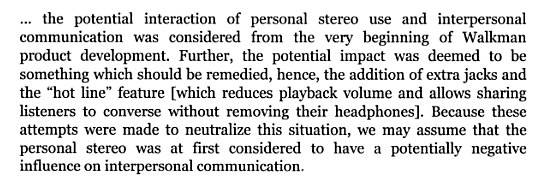An Asshole Theory of Technology

One of the selling points of the Apple Watch is that it can help make you less of an asshole. This was the thrust of the first major report about what the watch is like to wear, published before we knew what it looked like. It’s in Apple’s marketing. “You know how very often technology tends to inhibit rather than enable more nuanced, subtle communication?” Jony Ive asked in an interview with Vogue.
It is also at the core of the New York Times review.*
The effect was so powerful that people who’ve previously commented on my addiction to my smartphone started noticing a change in my behavior; my wife told me that I seemed to be getting lost in my phone less than in the past. She found that a blessing.
This reminded me of something I came across a few years ago. It’s an account of Sony Chairman Akio Morita testing out the first Walkman:

And an accompanying note, written a decade later in 1989, from writer Rebecca Lind (both collected from this book):

There seems to be something similar going on with the Apple Watch: an assumption not just that watches don’t do enough, or that other smartwatches are bad, or that an Apple Watch might allow people to do new things, but that the Apple Watch can, and must, fix the way people behave. It is, in this view, a tool for correcting problems created by the device to which it must be paired to operate. The Apple Watch is supposed to be a filter between you and your attention-suck hellworld smartphone; we will give it permission to intervene because it is slightly easier to look at while reducing our what’s-going-on-over-there-by-which-I-mean-in-my-pocket — by-which-I-mean-everywhere-else anxiety just enough to keep us sane. It provides a slight buzz, hopefully just enough, at a lower social cost. So it’s a little like… methadone?
Sony was worried that its portable stereo would be alienating. This turned out to be true. But the impulse to correct it was wrong: the thing that made it alienating was precisely the thing that made it good. The more compelling a gadget is, the more you use it, the more the people around you resent you for using it, the more they are pressured to use it themselves. (The fact that these devices are now all connected to each other only accelerates the effect.)
This is the closest thing we have to a law of portable gadgetry: the more annoying it is to the people around you, the “better” the concept. The more that using it makes you seem like an asshole to people who aren’t using it, the brighter its commercial prospects.
Consider an extreme example: Skip ahead past whatever replaces Google Glass** and the Oculus Rift to, say, mostly invisible lenses that take over for most of what we use phones for now (and, presumably, quite a bit more). It will certainly be tempting to suggest that the lens is less “distracting” then a phone or a tablet or a watch or a headset that blocks your view. And it will certainly help remedy the specific behaviors associated by previous devices. But just imagine how much of an asshole you’ll seem like to people in your physical vicinity for whom lensworld is inaccessible. You will be less present to non-participants than ever, even if your outward appearance and behavior lacks previously known asshole qualities. You will be two feet away and living on a different planet. (Though by then, maybe phone-level distraction will be normalized. Why prioritize people talking to you from two feet away over people talking to you from 100 miles? What the hell is your problem you stupid bad idiot? I’m talking to someone here, way over there.)
This is not to say that the Apple Watch won’t be successful, or that it will. But if it is, it probably won’t be for the reasons reviewers think, or even necessarily for the reason Apple thinks (it was designed by a self-described “group of people who love our watches,” which, what? Who??). It won’t be because it’s a better watch (boring, weird, WRONG) or because it makes non-Apple-watch users less irritable (anti-marketing). It will succeed if it can create new rude exclusionary worlds for its wearers (this is why I wouldn’t underrate the weird “Taptic” communications stuff).
It will succeed, in other words, to whatever extent it allows people to be assholes.
*The Verge review recognized a specific manner in which the Apple Watch can be more alienating than a phone: “It turns out that checking your Watch over and over again is a gesture that carries a lot of cultural weight. Eventually, Sonia asks me if I need to be somewhere else. We’re both embarrassed, and I’ve mostly just ignored everyone. This is a little too much future all at once.” The Bloomberg review, which was not terribly positive, might contain the strongest endorsement: “In some ways, it can be more distracting than your iPhone, and checking it can feel more offensive to people around you than pulling out your phone. The watch wants and needs you now, as its insistent taps make painfully clear.”
**Google Glass was extremely annoying to other people but also failed. Why? Because it was garbage. It suggested, from the outside, a rich and exclusive world without actually providing one to its wearer. It play-acted an asshole future without actually creating one.
